This article will take you through the concept of time adverb with the help of examples.
Time adverb or adverb of time tells us when an action took place. It also gives information about
how long and how often an action happened.
Usually they describe a point of time in the past, present and future .Some commonly used time adverbs
are now, then, soon, today, tomorrow, never, lately ,yet, still, recently, tonight, early etc.
Let us look at some time adverb examples.
- 1. He called his mother yesterday.
- 2. I am going to meet him today.
- 3. Ram meets his client now.
- 4. We are arranging a party tonight.
- 5. I will be leaving for France soon.
- 6. Ann will do her homework later.
- 7. My cab reached late today.
- 8. I wake up early.
- 9. He left for Chicago an hour ago.
- 10. I have already submitted the project.
- 11. I was reading then.
- 12. Teresa just arrived home.
- 13. I bought a house recently.
- 14. Jerry has been so depressed lately.
- 15. Where did you work previously?
- 16. I have never been to India before.
- 17. I researched on that topic for a year.
- 18. I wandered around the park all day.
- 19. I practised dance for three hours.
- 20. He has been living in Bombay since 1990.
- 21. She lived in a hostel for three months.
- 22. I stayed there for a while.
- 23. I often visit my grandfather.
- 24. He rarely leaves his room.
- 25. I never smoke.
- 26. I visit the club frequently.
- 27. Ann goes to the church regularly.
- 28. Do you still work for that company?
- 29. Are you still practising violin?
- 30. I am still waiting.
- 31. Haven’t you finished your dinner yet?
- 32. She has not revealed the secret yet.
- 33. Generally, I do not go fishing.
- 34. I generally do not go fishing.
- 35. I write for four hours every Thursday.
- 36. I exercised daily last year.
- 37. She was on leave for two days last week.
- 38. He practised in the basketball court for five hours every day last year.
- 39. Later Roger threw the knife away.
- 40. Roger later threw the knife away.
- 41. Roger threw away the knife later.

1. He called his mother yesterday.
“Yesterday” is the time adverb used here . It shows when did he call his mother. It talks about a particular moment in the past.
2. I am going to meet him today.
The adverb of time in the sentence is “today”. It tells us when an action is taking place. It talks about a point of time in present.
3. Ram meets his client now.
“Now” is the time adverb used here. It tells us when does Ram meet his client. The time adverb here talks about a point of time in the present.
4. We are arranging a party tonight.
The adverb of time used here is “tonight’. It shows when an action is taking place.
5. I will be leaving for France soon.
Time adverb used here is “soon”. It tells when will I be leaving for France.Time adverb used here describes a future action.
6. Ann will do her homework later.
The time adverb used here is “later”. It is used to describe when will Ann do her homework. Later is used here to modify a future action.
7. My cab reached late today.
“Late” is the time adverb used here.It talks about a point of time in the present.
8. I wake up early.
The time adverb used here is “early”. It shows the time or when an action takes place.
9. He left for Chicago an hour ago.
Here “ago “is the time adverb. It shows when did he leave for Chicago.
10. I have already submitted the project.
The adverb of time used here is”already”. Here already is used to indicate an action which was finished before the moment of speaking .That is ,it shows a past action.
11. I was reading then.
“Then” is the time adverb used here. It is used here to denote an action which was happening in the past.
12. Teresa just arrived home.
Here “just” is used as an adverb of time. It helps to denote an action which was carried out a short time ago.
13. I bought a house recently.
“Recently” is the time adverb used here. It tells us when did I buy a house.
14. Jerry has been so depressed lately.
The adverb of time used here is “lately .Lately is used to show an action that has been happening since a short time ago.
15.Where did you work previously ?
“Previously “is the time adverb used here. It talks about the past.
16. I have never been to India before.
The time adverb used here is “before”. It is used to talk about the past.
17. I researched on that topic for a year.
“For a year “ is used as the time adverb here .It describes how long an action takes place. In an adverbial phrases where for is used ,an expression of duration follows for.
18. I wandered around the park all day.
“ All day” can be considered as the time adverb here. It shows how long an action takes place.
19. I practised dance for three hours.
The time adverb used here is “for three hours”. It shows how long did I practice dance.
20 . He has been living in Bombay since 1990.
“ Since 1990” is the time adverb here. Since is followed by a specific point of time.It expresses a period of time.
21. She lived in a hostel for three months.
“For three months” is the time adverb here.It shows how long an action lasted.
22.I stayed there for a while.
“For a while “ is the time adverb used here. It shows how long an action lasted.
23. I often visit my grandfather.
The time adverb used here is “often”.It shows how often do I visit my grandfather.
24. He rarely leaves his room.
“Rarely” is the time adverb used here.It shows how often an action takes place.
25. I never smoke.
“Never” is the time adverb used here.It shows how often an action takes place.
26. I visit the club frequently.
“Frequently” is the time adverb here. It tells us how often do I visit the library.
27. Ann goes to the church regularly.
“Regularly” is the time adverb.It shows how often does Ann go to the church.
28. Do you still work for that company?
“Still” is the time adverb here. It shows the continuation of an activity. Still can be placed before the main verb in questions.
29. Are you still practising violin?
“Still” is the time adverb used here. It shows the continuation of an activity. Still is placed before the main verb.
30. I am still waiting.
The time adverb used here is “still’. It is placed after the auxiliary verb am and before the main verb waiting.
31. Haven’t you finished your dinner yet?
“Yet” is the time adverb used here. Yet is used in a question here to show something which has not happened, but is expected to happen.
32. She has not revealed the secret yet.
The time adverb used here is “yet”. This is a simple negative sentence using yet to show an action which has not happened but is expected to happen.
33. Generally, I do not go fishing.
“Generally” is the time adverb used here . Here generally is placed at the beginning of the sentence. Therefore the meaning of the adverb is stronger.
34. I generally do not go fishing.
Here the time adverb “generally” is in a weaker position. Thus when the position of adverb plays a role in conveying the meaning.
35. I write for four hours every Thursday.
“For hours” and “every Thursday” are the two time adverbs .Here we used them in the order, how long and then how often.
36. I exercised daily last year.
The time adverbs are “daily” and “last year”.The order we used here is how often followed by when.
37. She was on leave for two days last week.
“For two days” and “last week”are the two time adverbs. How long followed by when is the order of time adverbs we used in the sentence.
38. He practised in the basketball court for five hours every day last year.
“ For five hours”, “ every day” and “last year” are the time adverbs .The order of adverbs of time followed here is how long, how often and when.
39. Later Roger threw the knife away.
The time adverb used here is “later”. It is placed at the beginning of the sentence. Therefore, time has the emphasis in this sentence.
40. Roger later threw the knife away.
“Later” is the time adverb.Here later is used in a more formal sense.
41. Roger threw away the knife later.
“Later” is the time adverb here. It is placed at the end of the sentence.No emphasis is given.This is a neutral way of using later.

Hi, My name is Ammu Shaji. I hail from Kerala. I hold a post-graduate degree in English Language and Literature. I am an Academic writer by passion and profession.